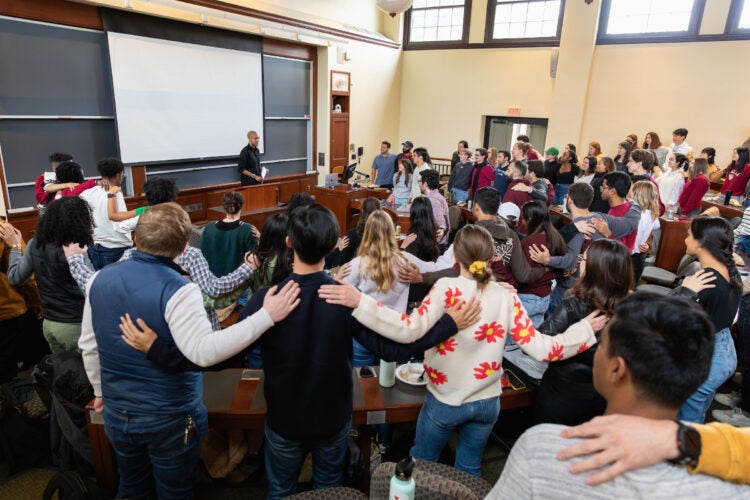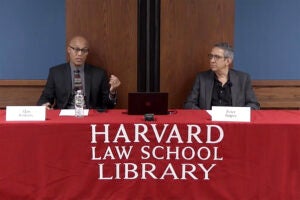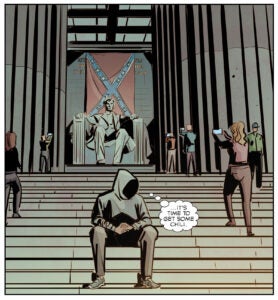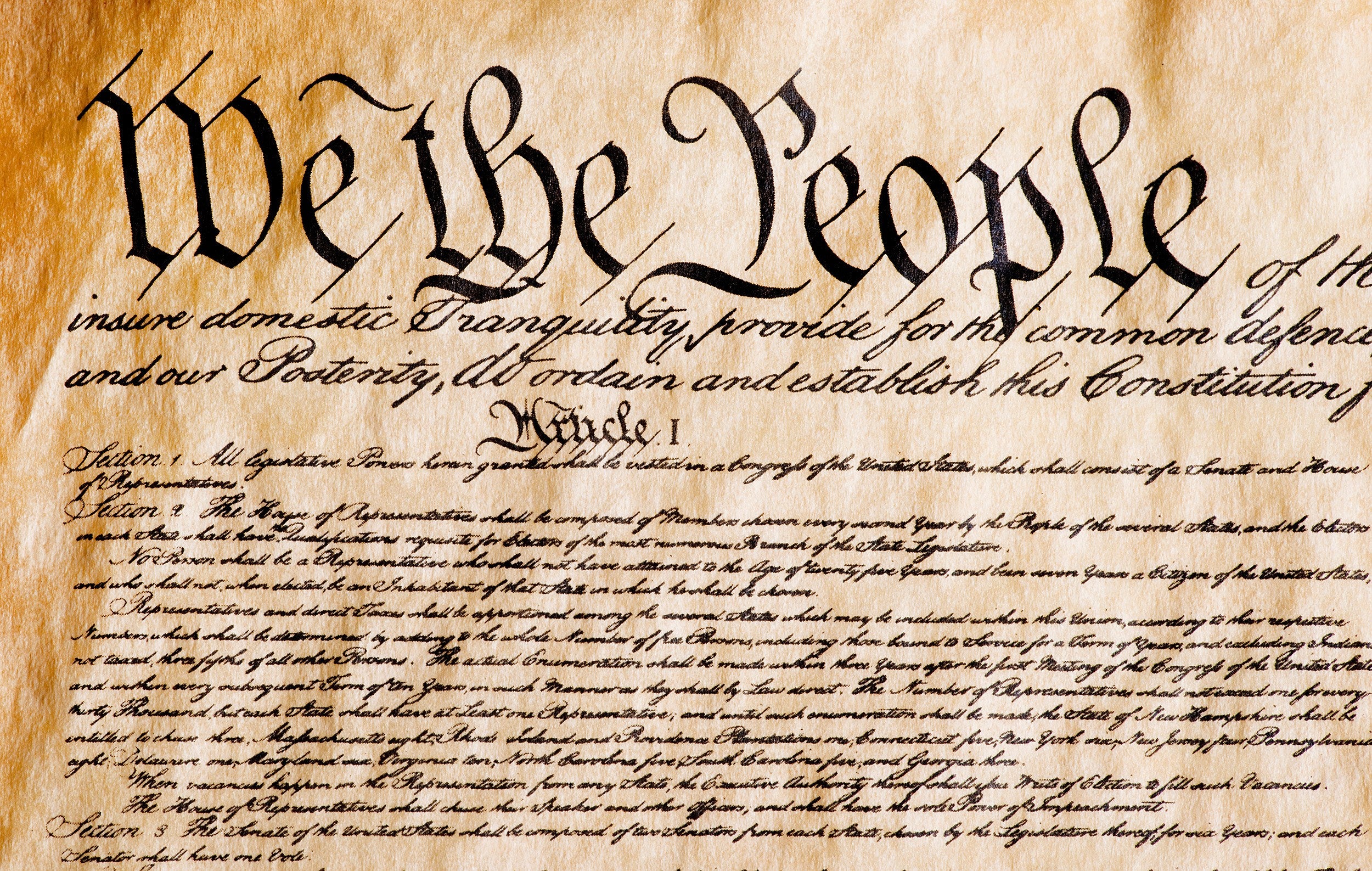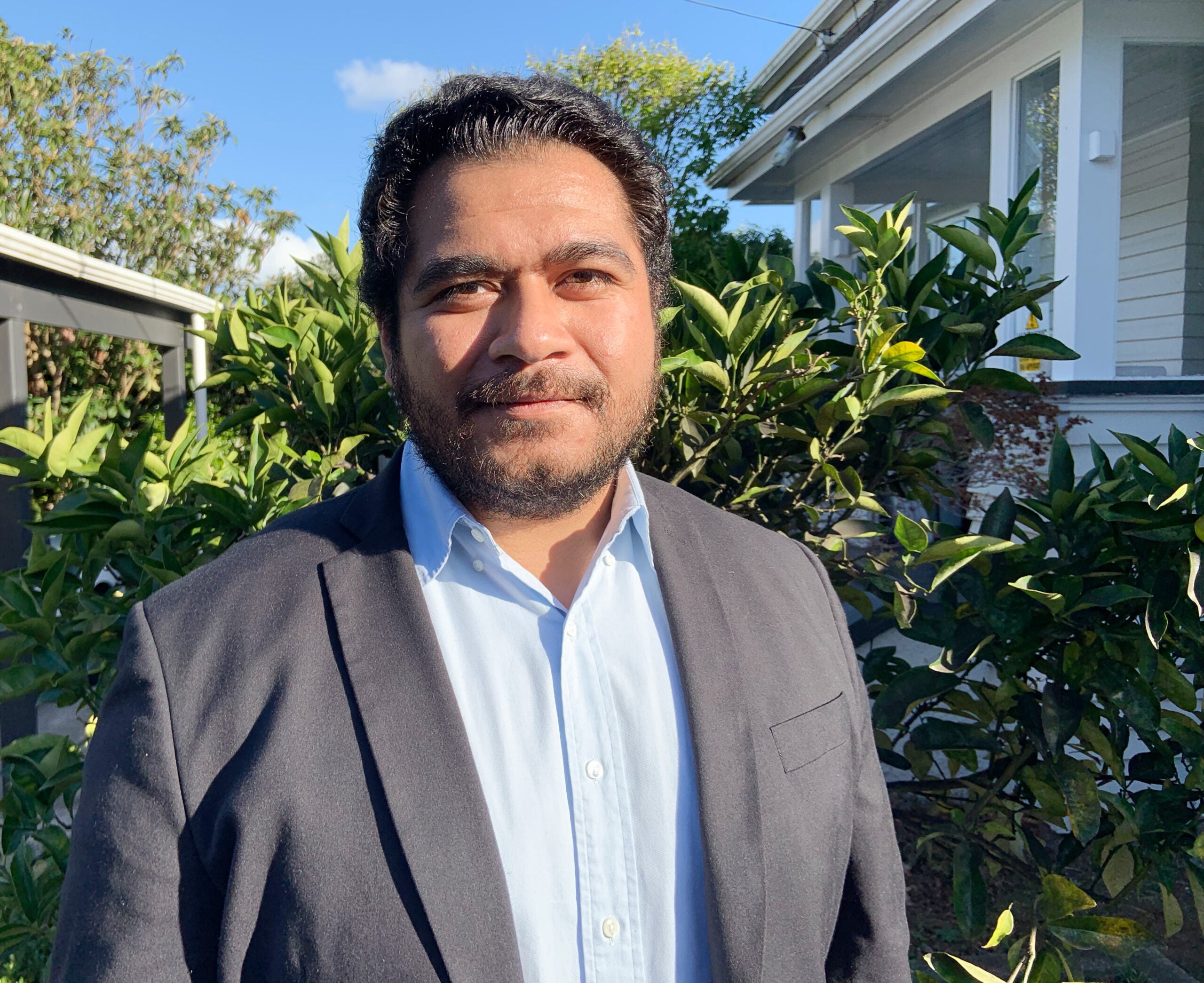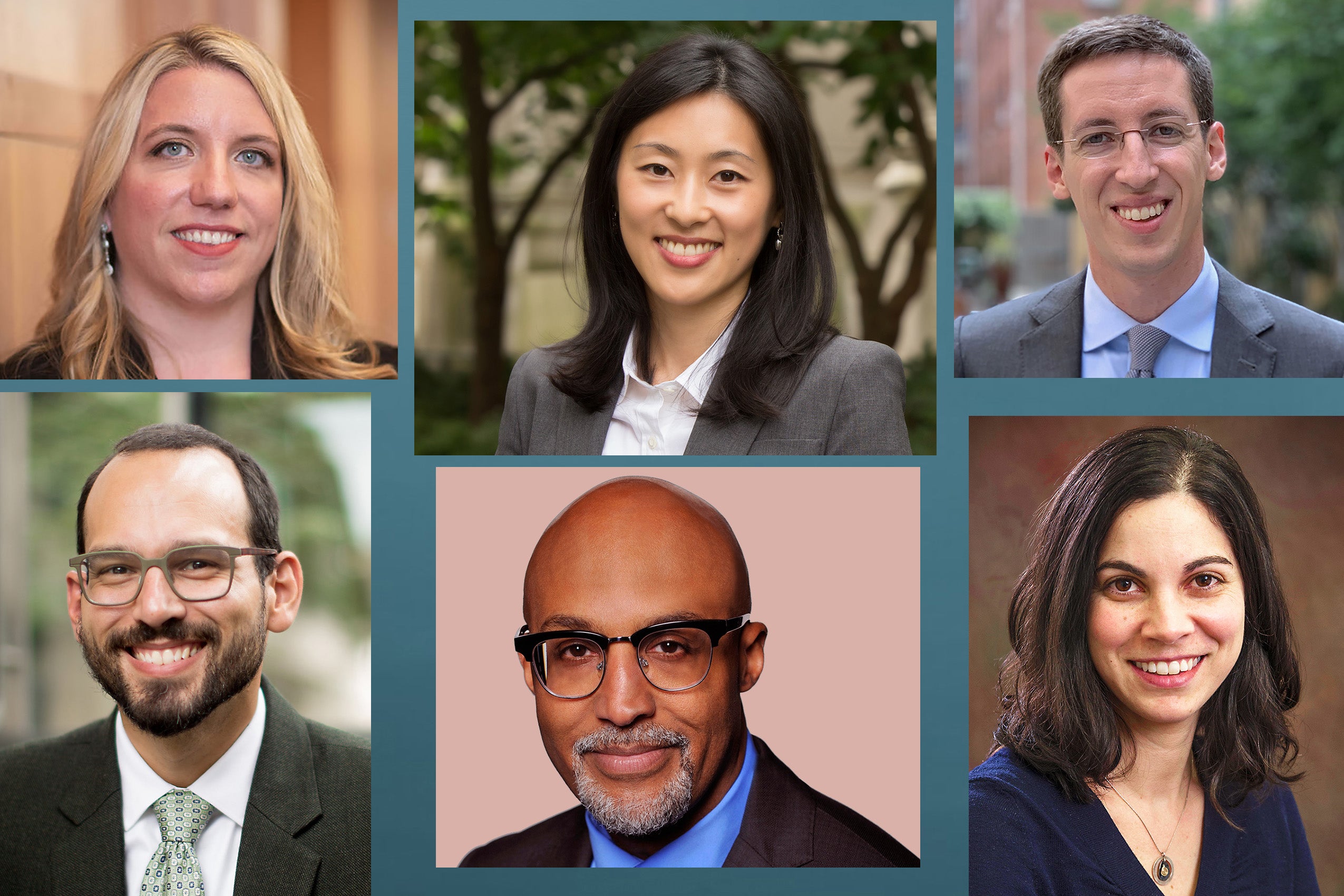People
Alan Jenkins
-
In a Harvard Law School Library book talk, Professor Alan Jenkins ’89 discusses his graphic novel series about the Jan. 6, 2021 attack on the U.S. Capitol.
-
Drawing Down Democracy
June 27, 2023
The first of four volumes of “1/6: The Graphic Novel,” co-written by Alan Jenkins ’89, envisions a fictitious aftermath of the attempted insurrection of Jan. 6, 2021
-
An armed militia fires at will to shut down a TV news network in Washington. A Confederate flag hangs behind the statue in the Lincoln…
-
Alabama challenge to Voting Rights Act heard by Supreme Court
October 5, 2022
The Supreme Court heard arguments Tuesday over a lawsuit in Alabama that could have a significant impact on voting rights moving forward. The suit was…
-
Judge Ketanji Brown Jackson defends her record during Supreme Court confirmation hearings
March 23, 2022
Judge Ketanji Brown Jackson is defending her record during the second day of hearings on her nomination to the Supreme Court. Alan Jenkins, professor of practice at Harvard Law School, joins CBS News' Tanya Rivero and Nikki Battiste with more on how the judge is responding to certain lines of questioning.
-
Biden nominates Ketanji Brown Jackson to SCOTUS
March 3, 2022
President Biden has nominated Ketanji Brown Jackson to replace retiring Supreme Court Justice Stephen Breyer. Harvard Law School professor Alan Jenkins joins CBS News' Lana Zak to discuss.
-
Law professor on Biden’s potential nominees to the Supreme Court
January 31, 2022
President Biden has vowed to nominate the first Black woman to the Supreme Court as Justice Stephen Breyer prepares to retire. Harvard Law professor Alan Jenkins joins CBS News to discuss who the potential nominees are and what the appointment will mean for the highest court in the country.
-
‘Our original Constitution was both brilliant and highly flawed’
September 15, 2021
Harvard Law Professor Alan Jenkins discusses the U.S. Constitution and its treatment of race, how to guarantee fundamental rights, and why lawyers should be better communicators.
-
Five fellows for the 2020-21 Black List and Google Assistant Storytelling Fellowship were announced Monday. The program will provide financial and creative support to five writers in the development and execution of a new original feature film script or TV pilot under the condition that the project tells a contemporary story from the perspective of historically underrepresented communities...Alan Jenkins, a law professor, writer, and advocate who has devoted his career to the intersection of storytelling and social justice. Descended from African-American migrants from the South and immigrants from the Caribbean, the Black experience is central to much of his storytelling. Jenkins seeks to engage broad audiences with shared values and new ideas and believes diverse and inclusive storytelling is especially important at this critical time in our nation’s history. He has worked as a Supreme Court law clerk, civil rights lawyer, human rights grantmaker, and non-profit communications strategist.
-
Guilty verdict spared George Floyd’s family more injustice, Harvard law professor says
April 21, 2021
Former police Officer Derek Chauvin was found guilty on Tuesday for murdering George Floyd. But the verdict did little more than save George Floyd's family from suffering more injustice, says Harvard law professor Alan Jenkins. "The absence of injustice is not the same as justice," Jenkins tells CBSN's Elaine Quijano.
-
Testimony continued for the fourth day in the murder trial of former police officer Derek Chauvin as witnesses offered often emotional testimony on the death of George Floyd. Alan Jenkins, a professor of practice at Harvard Law School, joins CBSN with more on how this case could change accountability for police officers.
-
Supreme Court hears arguments on Affordable Care Act
November 11, 2020
The Supreme Court heard arguments today on a Republican challenge to the Affordable Care Act. Harvard Law School professor Alan Jenkins joins CBSN's Tanya Rivero to discuss the implications of the case.
-
Democrats boycott committee vote on Amy Coney Barrett’s nomination
October 23, 2020
Republicans on the Senate Judiciary Committee have unilaterally advanced the nomination of Judge Amy Coney Barrett to the Supreme Court, in spite of a boycott by Democrats. Harvard Law Professor Alan Jenkins joined CBSN to break down what Barrett's impact could be on the court.
-
Soon after learning that “Black Panther” star Chadwick Boseman had died at age 43, fans urged Marvel Studios not to recast the role, setting up a dilemma for the studio planning a sequel to Hollywood’s first major superhero film with a predominantly Black cast. Writers, academics and activists - speaking to Reuters about the film’s cultural impact and Boseman’s performance - believe Marvel and its parent company, Walt Disney Co, should honor Boseman’s legacy with a storyline that anoints a new Black Panther from the film’s existing cast or elsewhere in the Marvel Universe... “‘Black Panther’ the film was a huge cultural landmark,” said Alan Jenkins, a professor of practice at Harvard Law School. “One part of what made the film so important was the world of Wakanda and the idea of an African nation unchained by colonialism, slave trade, exploitation. It had dignity, brilliance and technology.” Today “Black Panther” is even more relevant, as Black Americans disproportionately suffer from COVID-19 and die at the hands of police, cultural experts say. The aspirational Wakanda provides an antidote to that suffering. “The film certainly didn’t cause the activism of today - that was from the tragic killing of George Floyd and others,” said Jenkins. “But it contributed to an environment where we can see new realities and imagine a world that is more just and equitable than the one in which we live.”
-
After the protest…what next?
June 12, 2020
An article by David Harris: First, and essentially, we must reckon with what our history has wrought. As difficult as such a reckoning will be to define, indicators will reveal the extent to which we have succeeded. In order to facilitate the process, we must acknowledge a foundational point: “We the People” has never included all of us. That cannot be subject to debate. Once we acknowledge this defining exclusion, we can trace the myriad ways in which having denied large groups of people, notably African Americans and Native Americans, the most basic rights of membership and participation — the qualities of citizenship — has diminished life chances for individuals and communities. Understanding the real, ongoing harm from policies and practices that have differentially distributed access and opportunity, state violence, and deprivation will open our eyes to avenues for repair and restoration. We must rethink our notions of justice, as well. Our current coupling of criminality and justice locks us into a fixation on punishment in lieu of a system of justice. I understand justice as being made whole, which promotes practices that center on health and well-being of all residents, and whole communities, as the hallmarks of safety. Another more tangible indicator of our progress on the pathway to reckoning will be whether we not only hear and empathize with what people who have suffered for decades are saying, but act in truly responsive ways. As people are taking to the streets at great risk to themselves to decry the institutionalized racial violence perpetuated by policing, promoting legislation that bans chokeholds is tone deaf.
-
Dylan Asafo LL.M. ’20 plans to use his HLS education to help address the inequalities facing communities of color in New Zealand and the wider Pacific region.
-
During the 19th-century emancipation movement, some of the most important voices were those of Black abolitionists. “This was especially true of those who had experienced slavery,” Roy E. Finkenbine told NPR...Those who have directly experienced the prison system are likewise championing the prison abolition movement. I have been one of these directly impacted former prisoners who have been centered at such events. I don’t attend such forums to receive financial compensation, but rather to do what I can to help end mass incarceration. That said, former prisoners often leave these events without receiving any remuneration — not even for transportation — and they return to their marginalized, economically insecure lives until called forth again by their liberal allies — just like many formerly enslaved people...As Alan Jenkins, professor of practice at Harvard Law School, told me, “We all have a responsibility to understand and accommodate the circumstances of formerly incarcerated leaders.” Since I cannot wait for others to realize they must offer understanding and accommodation, I’ve got my business license for consulting and website up and running as Webb recommended. I hope former prisoners continue to use their voices to mobilize audiences against mass incarceration—and I hope the institutions and organizations that offer them a platform will begin offering them equitable remuneration, too.
-
New this year for HLS faculty
September 12, 2019
With the start of the academic year, four new scholars have joined the ranks of the Harvard Law School faculty and two have been promoted to professor of law.
